#kids schools bengali square
Explore tagged Tumblr posts
Text
Your Child’s First Step: Trusted Pre-Primary School in Indore
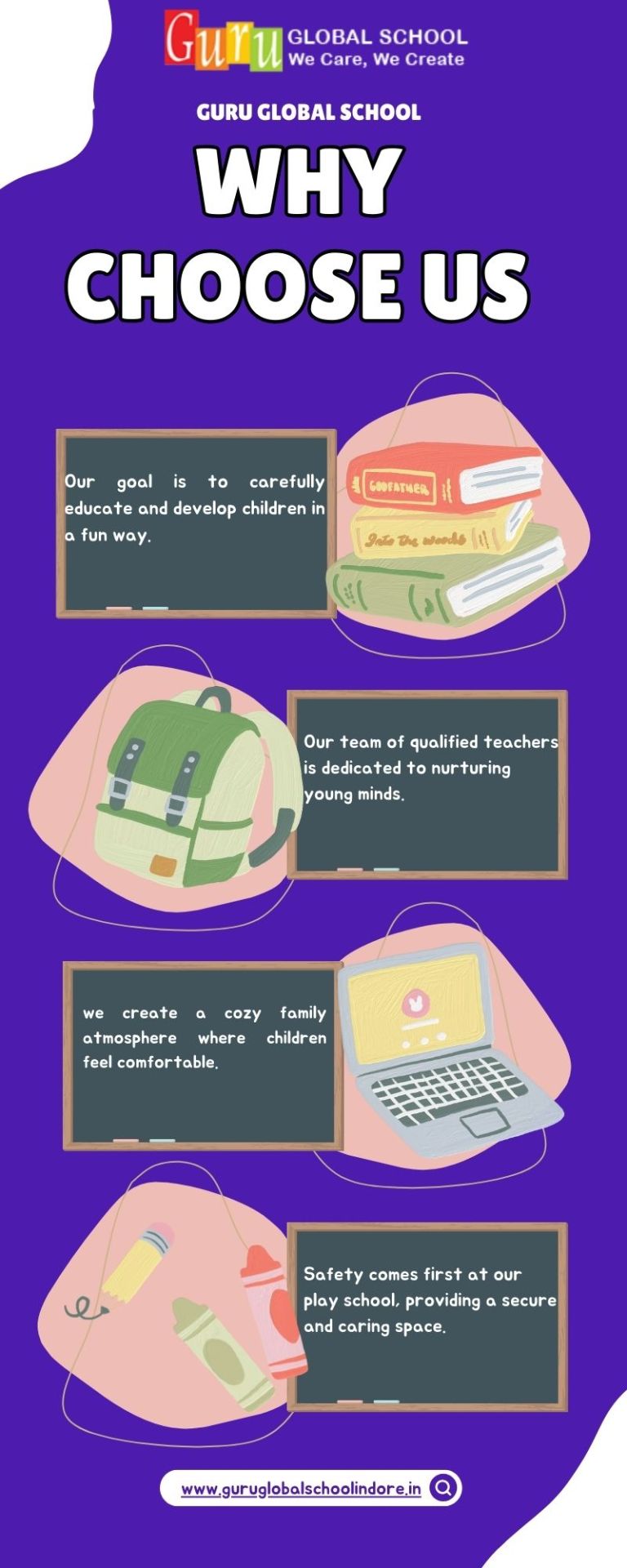
Give your child the best start at our pre-primary school in Indore. From playful learning to value-based teaching, we create a solid foundation for lifelong success and happiness.
1 note
·
View note
Text
Building Healthy Habits: 5 Essential Wellness Tips for Children
Early childhood is the perfect time to instill habits that set the stage for a lifetime of health and happiness. As toddlers grow, their developing bodies and minds need a balanced approach to nutrition, physical activity, emotional nurturing, and routine care. Here are five practical tips for fostering lifelong wellness in your toddler.
1. Provide a Balanced and Nutritious Diet
Nutrition is the cornerstone of your toddler's growth and development. A well-rounded diet supplies the essential vitamins, minerals, and energy they need.
What to include: Fresh fruits, vegetables, lean proteins, whole grains, and dairy products.
What to avoid: Processed foods, sugary snacks, and excessive salt.
Pro tip: Make mealtimes enjoyable by serving food in colorful, fun shapes. Offer small portions of new foods to encourage adventurous eating habits.

2. Encourage Physical Activity and Active Play
Toddlers thrive when given the opportunity to explore their environment through movement. Active play helps improve motor skills, coordination, and overall fitness.
Ideas for activities: Dancing, climbing, jumping, or playing ball games.
Outdoor fun: Nature walks, trips to the park, or simple backyard play.
Pro tip: Join them in their activities to bond and model an active lifestyle.
3. Prioritize Healthy Sleep Routines
Sleep is vital for toddlers, as it aids in physical growth, brain development, and emotional regulation.
Recommended sleep duration: 10-14 hours daily, including naps.
Bedtime routine: Establish a calming routine, such as a warm bath, reading a book, or listening to soft music.
Pro tip: Keep the bedroom dark, quiet, and cool to create an ideal sleeping environment.
4. Support Emotional and Social Growth
Toddlers are in a critical phase of learning to communicate and interact with others. Helping them manage emotions and build social skills sets the stage for positive relationships and emotional resilience.
Activities to try: Role-playing games, storytelling, and group play with peers.
Teach sharing and empathy: Encourage them to take turns and understand others’ feelings.
Pro tip: Acknowledge their emotions and guide them gently through challenging moments.
5. Schedule Regular Health Checkups
Routine checkups are essential for monitoring your toddler’s physical and developmental progress.
What to include: Immunizations, vision and dental screenings, and growth assessments.
Preventive care: Teach basic hygiene habits, such as handwashing and teeth brushing.
Pro tip: Turn doctor visits into a positive experience by explaining their importance and rewarding your child’s cooperation.

Raising a healthy toddler is a rewarding journey that requires attention to their physical, mental, and emotional needs. By nurturing these habits early, you’re setting your child on a path toward a lifetime of wellness and happiness. Start small, stay consistent, and watch your little one thrive!
Guru Global School is the Best Preschool for Kids in Indore, offering a nurturing environment where young minds flourish. With a focus on holistic development, innovative learning techniques, and a child-friendly approach, we ensure every child’s early years are filled with joy, creativity, and growth. Choose Guru Global School for a strong foundation in your child’s education journey.
#preschool in indore#best preschool for kids#top kindergarten in indore#best daycare in indore#daycare for toddlers#best nursery schools#kids schools bengali square#top senior kg school in indore#junior kg school in bengali square#best junior kg school
0 notes
Text
Admission Now Open at Best Price for the Academic Year 2024-25 at Guru Global School, Indore

Introduction:
The door is now open for a life-changing educational experience. Guru Global School is excited to announce that admissions are now open for Best Preschool in Indore the upcoming academic year 2024-25. As parents and students explore educational options, this is the perfect time to discover the enriching environment, academic excellence, and holistic development offered by Guru Global School. Guru Global Kids Schools Bengali Square is a hub of learning that blends modern education with traditional values.
Why Guru Global School?
1. Nurturing Excellence:
Guru Global School is not just a place of learning; it's a community dedicated to nurturing excellence. With a curriculum designed to cater to diverse learning styles, our school fosters a love for learning from the earliest stages of education to the higher grades.
2. State-of-the-Art Facilities:
Our commitment to providing a conducive learning environment is reflected in our state-of-the-art facilities. Well-equipped classrooms, modern laboratories, extensive libraries, and sports facilities ensure a holistic approach to education, where students can explore their interests beyond textbooks.
3. Experienced and Passionate Faculty:
The backbone of our institution is our team of experienced and passionate educators. Committed to personalized attention, our teachers go beyond the curriculum to ensure every student reaches their full potential, both academically and personally.
4. Holistic Development:
Education at Guru Global School extends beyond traditional academics. Our emphasis on extracurricular activities, arts, sports, and leadership programs allows students to discover and enhance their talents, fostering well-rounded individuals.
Admission Process Made Simple:
Navigating the admission process at Guru Global School is a breeze. Visit our website for all the details on the admission procedure, eligibility criteria, and important dates. Secure your spot and embark on a journey of academic and personal growth.
Connect with Us:
Have questions or eager to experience the school firsthand? Contact us through the website to schedule a campus visit. Explore testimonials to understand the positive impact Guru Global School has had on the lives of students and parents.
The opportunity to join Guru Global School is knocking at your door. Seize this chance to provide your child with an education that goes beyond textbooks and exams. Join our vibrant community where excellence meets opportunity, and let Guru Global School be the launchpad for your child's bright future. Admission is open, and the adventure of a lifetime awaits!
1 note
·
View note
Text
Enrich your child's formative years with Guru Global Preschool Bengali Square – where every day is an opportunity to grow, explore, and thrive. Connect with us for admissions and set your child on a path to a bright and promising future
0 notes
Text
How to Teach Children's Vocabulary?
Vocabulary plays a crucial role in effective communication. At times, even when we have a good understanding of a subject, we may struggle to find the right words to express ourselves clearly. This challenge is not limited to adults; it also applies to children. Therefore, it is essential to teach children vocabulary to ensure they can comprehend concepts and communicate effectively with others. By enriching their vocabulary, we empower children to express themselves more clearly and engage in meaningful conversations with confidence. Let's explore effective methods to teach children vocabulary.

Music as an Engaging Vocabulary Tool
Music is one of the most effective ways to teach vocabulary. When we listen to music, we understand better, making it a great tool for easy comprehension. With its various rhythms and melodies, we can choose songs that help children learn vocabulary in a fun and engaging manner.
Use Flashcards and Word Games
Flashcards and word games are valuable tools for teaching children's vocabulary. Create flashcards with pictures and corresponding words to make learning more interactive and visual. Play word games like 'I Spy', 'Word Bingo', or 'Scrabble Junior' to make learning vocabulary fun and engaging. These games not only introduce new words but also reinforce spelling, pronunciation, and comprehension skills.
Repeat Vocabulary in English Conversations
Engaging in conversations with children in English and consistently repeating vocabulary is a highly effective teaching method. When you communicate with children and repeat the same words or phrases, they absorb the information through active listening. This repetitive exposure helps them understand and retain the vocabulary more effectively, reinforcing their learning in a natural and engaging way.
Introduce a Word of the Day
Regularly introduce new words to the kids so that they learn consistently. This is the best way to teach vocabulary regularly, helping children learn more effectively.
Teaching vocabulary at home has its limitations, as children may not communicate with friends and therefore have limited exposure. This is where playschools play a crucial role. We are the best play school in Bengali Square, boasting excellent teachers and a nurturing environment that fosters your child's growth. In our playschool, we teach children these things through fun and engaging methods.

1 note
·
View note
Text
How the Best Preschool for Kids in Indore is Embracing AI & EdTech for Smarter Learning
A New Era of Learning Begins Early
In today’s digital age, even the youngest learners are stepping into classrooms powered by smart technology. The Best Preschool for Kids in Indore, especially in areas like Bengali Square, are redefining early childhood education by adopting cutting-edge tools like Artificial Intelligence (AI) and Educational Technology (EdTech). If you’re searching for the Best Play Schools near me, understanding how these schools are leveraging technology can help you make an informed decision for your child’s future.

What Is EdTech and Why Does It Matter in Preschool?
EdTech refers to the use of technology—like tablets, smartboards, and interactive apps—to enhance learning experiences. At the Best Preschool in Indore, children engage with age-appropriate digital tools that support cognitive development, creativity, and communication skills.
How AI is Revolutionizing Play School Education
Artificial Intelligence isn’t just for tech giants—it’s making its way into preschools too! At top Play Schools in Bengali Square, AI-driven platforms:
Personalize learning plans for each child
Monitor progress in real-time
Provide interactive games that adapt to a child’s pace
Offer instant feedback to both students and teachers
This creates a nurturing, engaging, and efficient environment that’s far beyond traditional blackboard methods.
Benefits of Tech-Enabled Learning for Preschoolers
Here’s how smart classrooms are making a difference in the Best Play Schools near me:
✅ Enhanced Engagement – Children respond well to interactive content and gamified learning. ✅ Early Tech Exposure – Prepares them for future digital classrooms. ✅ Parent Involvement – EdTech platforms offer real-time updates to parents. ✅ Customized Attention – AI helps teachers tailor lessons for each child’s needs.

Why Bengali Square Is Emerging as an Educational Hub
Bengali Square has become a hotspot for families seeking quality early education. The Best Preschool For Kids in this area combine traditional values with modern learning strategies. As a parent searching for the Best Play Schools near me, this locality offers the perfect blend of safety, community, and innovation.
0 notes
Text
Guru Global School, a top Senior KG school in Indore, ensures a strong educational base with a focus on fun learning. Recognized as a best preschool for kids, we provide expert teaching and engaging activities at our play school in Bengali Square.
0 notes
Text
1 note
·
View note
Text
Theater of the Soul - Chapter 6
They'd spoken in tongues around him, he'd heard. None of them knew that he understood them.
"<You crazy enough to take the boy away from him, you bastard, then you should be crazy enough to eliminate him!>"
He hadn't recognized the voice. But the language was Hispanic - a learned language, not a street- or birth-earned language. He'd suspected a white, upper-class somebody being there other than... than the horror that is the clown. He had not heard the reply, only that it was followed by a lot of loud noises. Ugly, loud noises. The last time he had heard those kind of noises, cops were later seen leaving the apartment next to his after taping the door with bright yellow ribbons.
And then he was leaving. He'd had no idea where to, or how. Just that he was leaving. Leaving all the noises behind.
And there was a lot of blood in his line of sight. Only he wasn't sure if it was his line of sight or his own eyes. Maybe it had been him bleeding. Maybe he'd caused the bleeding, he couldn't be sure. He knew there were others - warm, soft bodies.
And then everything was cold and chilly again. There was so much pain, too. And he'd kept moving. Somehow, his brain had told him to keep moving, ignore the pain and just keep moving. That keep moving would be his best bet to survive.
Barbara's friends were... scary ladies, if anyone would ask Tim. Fortunately, no one would ask. And they looked... well, Dinah Lance and Helena Bertinelli looked like they'd just walked out of 'The Gladiator' movie set - almost complete with Roman gladiator garb. They were both tall, and even if Tim's brain said that Barbara would've been just as tall if not for her wheelchair, the two ladies still looked imposing to him.
The three of them, Tim thought, looked very colorful - with Barbara's flaming red hair and fair skin, Dinah Lance's platinum blonde hair and peachy-tan skin, and Helena Bertinelli's jet black hair and dark chocolate skin.
And yes, he did not hide his surprise well when Helena said that she was a primary school teacher. "Does that mean I'll have to call you Miss Bertinelli?" he asked, only half joking because he did feel like he was still in Primary School.
Helena was glaring at him, and Tim hoped that she would at least be amused.
"You're... what? Ninth grader?" she asked.
Tim frowned. "I've graduated high school last year." he scowled. Yes, he was small even for 15. But he still has time to get some much-needed growth spurts, surely. Like one or two - or a dozen.
She looked surprised. "Well! A genius, Barbara? Who'da thunk it." she smirked.
"I would. His grandpa was Jeremiah Galavan." Barbara said, almost smugly. "The guy who almost singlehandedly built the wastewater treatment plant in Gotham. Even when everyone was laughing at him. I'm not surprised that Tim has his brain."
"Here I am thinking that Bruce would only take people with high theatrical aptitude." Dinah Lance said.
"My parents were stage actors." Tim told her. "That's how I know Bruce. They... left me in his custody when they died."
"That's nice of them..." Helena quipped. "So close in the heels of..." then she paused.
"He didn't take me in to replace Jason!" Tim snarled. "I was officially adopted before Jason left!"
"He never take anyone to replace anybody," Dinah said, practically calming him. "Bruce takes orphaned children because of his own deep need to make sure you won't be lost in the system. Like some of his..." she paused and meet his gaze, "... earlier acquaintances." she finished. Tim suddenly got the thought that by 'acquaintances', she had meant herself.
"Matter at hand, ladies." Barbara reminded them.
"I'll go with the little genius bird." Helena stated, her voice sounded challenging.
Tim just sighed. He was not in the mood for arguing. It was already past 10.30 and he felt that they would be kind of wasting time if they were to argue on who rides with who. "Whatever." he said. "Can we go now? The addresses were arranged by location, anyway, and we've got some solid 33 thousand square miles to cover." he cringed inwardly, suddenly thinking just how small Gotham City suddenly felt.
"Relax, kiddo. We'll find him." Dinah patted his shoulder gently. "Bruce should've..." and she pressed her lips, willing herself not to say anything more.
"I don't disagree, Bruce should've asked for help back then. But that door is closed already. Now we move on." Barbara didn't snap, but her tone implied so. "We will find Jason. Even if it means knocking every damn door in the whole county of Los Angeles."
"Babs and I can start at the north side, from here onward to Antelope Valley areas." Dinah said. "You take the beaches?"
"Will do." Helena said.
"It's not like my wheelchair would be bothered with the beaches, you know." Barbara cocked her eyebrow at them. Her wheelchair was specially made - lacking the back handles because she didn't like to be pushed by anyone else; and has reinforced all-terrain wheels.
"Nothing to do with your wheelchair, hun. Southward are usually populated with family ones. While northward are veterans and otherwise." Dinah replied calmly. "They see your wheelchair and they'll be more inclined to talk than otherwise."
"Psychological query." Tim acknowledged.
"Yes, little bird, you got that right." Dinah gave him a finger-gun salute. Tim almost grinned.
Their plan for today was to prowl the homeless areas, as well as stopping by at Napier-owned buildings or whatever property he has. Tim was a little proud that Barbara did not shot down his suspicion that the reason Bruce hadn't been able to find Jason right off the bat would have been because Napier had somehow hidden Jason somewhere. He was not at any hospitals back then, and the only record of him showed that he was checked out of LA General Hospital a week after he was admitted. Bruce had even pulled all the stops by asking a load of favors from his friends to ask if any of the private rehab centers and/or hospitals would have had Jason there - to no avail.
Hence, really, Tim's suspicion that Napier was not what he appeared to be. Not 'merely' a stage critic, but was hiding something else. When the Harley Quinn club opened a mere few months after Jason went missing - based on the date of the accident and his last known whereabout as he was signed out of the hospital, Tim's suspicion was vindicated.
And his suspicion lead him to poke around the internet and unternet - the dark side of the web - to find out who the hell this Napier guy really is. Said poking around also provided him with a list of assets belonging to Napier, mostly in Los Angeles County area - much to his relief; a small number in Gotham. Dick would poke around at the Gotham ones - excluding Quinn's club - with Barbara's father, James Gordon, in the guise of finding a place for himself. James Gordon, the city's Mayor, would be a good smokescreen - no pun intended for his smoking habit, really - to hide their true purpose.
Tim has to begrudgingly admitted - albeit inwardly - that explaining the general gist of things to Helena was easier now that he has had time to mull it over and brainstorm it with Barbara. They have barely gotten a block away from the Penthouse when Tim's presentation of his theory finished.
"So how is it a brainiac kid like you get roped to the ever-glamorous world of showbiz?" Helena asked. "Yeah, I get it that your folks were in it. But you could've gotten yourself a scholarship somewhere, MIT? Ivy? I mean, why stay?"
Tim fiddled with the camera on his lap. The camera would be their cover story - building Helena's portfolio at interesting locations, or having her pretend to be a reporter if all else fails. "Why should I?" he asked.
"Why should you what?"
"Why should I go for technical stuff just because I'm a genius?" he pressed. "Why can't I be in arts, just because I can work out how a supercomputer works, or how a robot can move and walk and talk at the same time? Why can't I be a painter, or singer, or photographer?"
There was a few good seconds' worth of silence following Tim's questions, and he knew he'd stumped Helena.
"You're right. I actually never thought of it that way." she finally admitted. "Most of the kids in my school are average. There are a few with above-average intelligence, and they all tend to lean toward sciences."
"They do that because through science - things that has absolute, numerical and alphabetical quantifier - because they can prove their intellects through it. How about languages? Did you know that the English language - while the second most spoken language in the world, has significantly less amount of words? As in, it has only one word that defined art: 'work'. Bengali language has five, Russian has four, Arabic has five. That, to me, is interesting. Would you like to know how I found that out?" Tim asked, almost coyly.
"Okay, I'll bite. How did you find that out?"
"Jason Todd told me. People tend to think him stupid, just because he was a street urchin and didn't get to be schooled to show his academic skills. But he speaks five languages fluently. All of which he'd learned on his own by reading the books at the library. Is he not a genius, then?"
"Ah," she nodded. "I get it. There are many types of genius, and the more visible ones are those with science-based aptitude."
"Yes, that should answer your question on why I'm not interested with scholarships. I don't need them to do what I love. And what I love is--" Tim suddenly clamped his mouth shut, realizing his true motive in doing this. It has nothing to do with what he loved to do - taking photographs, sharing the printed evidence of things he could easily pull out from his memories with vivid details. Not because he'd wanted to 'save' Jason. Not because he didn't want to see Bruce upset and stressed.
He wanted to do this so that he could earn his place within the Wayne family. He wanted to prove that Bruce taking him was not a mistake. So that Jason would stop being mad at him. So that Jason would come home.
Before Helena could finish her questioning, thankfully, they were approaching their first target location,
#Tim Drake#Jason Todd#Barbara Gordon#Dinah Lance#Helena Bertinelli#JayTim#SoulTheater!AU#no-capeAU#BatFam
3 notes
·
View notes
Text
Sing, Say, and Play: A Fun Way to Learn Rhyming Words for Children
Rhyming words are an integral part of early childhood education, making language learning fun and engaging for children. They enhance phonetic awareness, help in language development, and make storytelling or poetry sessions more delightful. Whether it’s through catchy nursery rhymes or creative activities, introducing rhyming words to children opens the door to a playful world of learning.
What are rhyme words?
Rhyming words are words that have the same or similar ending sounds. For example, cat, hat, mat, and bat rhyme because they share the same ending sound "-at." Rhymes often form the foundation for songs, poems, and games that captivate children while teaching them important language skills.
Why are rhyming words important for children?
Phonemic Awareness: Rhymes help children recognize and work with sounds in spoken language.
Vocabulary Building: They expose children to new words and phrases.
Memory Boost: Rhyming patterns make it easier for children to remember words and phrases.
Creative Expression: Rhyming encourages children to play with words and explore language creatively.
Reading Skills: Recognizing rhyming words aids in decoding unfamiliar words, enhancing early reading skills.

Examples of rhyming words for children
Here are some common examples to kickstart their learning:
Short Vowel Rhymes
-at: cat, bat, hat, mat
-og: dog, log, frog, hog
-an: man, fan, pan, ran
Nature Rhymes
sky - fly - high
tree - bee - sea
sun - fun - run
Animal Rhymes
cat - rat - bat
frog - dog - hog
bear - hair - pair
Fun activities to teach rhyming words
Rhyme Matching Games Provide children with word cards and ask them to pair rhyming words. For example, pair hat with cat or dog with frog.
Singing Nursery Rhymes Classic rhymes like Twinkle, Twinkle, Little Star and Humpty Dumpty are great tools for teaching rhymes.
Rhyme Detective Read a short poem or story aloud and ask children to identify rhyming words.
Crafting Rhyming Poems Encourage children to create their own rhymes, starting with simple phrases like "I see a tree, buzzing with a bee."
Rhyming Word Bingo Create bingo cards with words and call out rhyming words. Children can mark the matching rhymes on their cards.

Rhyming in everyday life
Use everyday moments to explore rhymes. For instance, while cooking, you might say, “Can you think of words that rhyme with pan?” Making rhymes part of daily routines makes learning effortless and enjoyable.
Rhyming words are not just a fun linguistic tool but also a stepping stone for children’s language and cognitive development. Incorporating rhymes into activities and conversations helps children build a strong foundation for reading, writing, and creative thinking. So, sing a song, recite a rhyme, and let your child’s love for language blossom!
Guru Global School Best Junior KG School is designed to nurture young minds through a balanced blend of academics, creativity, and play. This program focuses on developing essential skills such as language, socialization, and problem-solving, all while making learning enjoyable. With a child-centric approach, we ensure that every child gets the attention and encouragement needed to thrive in their early educational journey.
#best preschool for kids#preschool in indore#top kindergarten in indore#best daycare in indore#daycare for toddlers#best nursery schools#kids schools bengali square#top senior kg school in indore#junior kg school in bengali square#best junior kg school
0 notes
Text
The Growing Importance of Early Childhood Education in Today’s World
Early childhood education has always been a cornerstone of a child's development, but in today’s fast-paced, ever-evolving world, its importance has reached new heights. The foundation laid during the early years not only shapes children’s academic journeys but also molds them into well-rounded individuals capable of navigating the complexities of life. Here’s why early childhood education is more critical now than ever before:
1. Building Cognitive and Emotional Resilience
In an era where children are exposed to a multitude of stimuli, fostering cognitive and emotional resilience is essential. Early childhood education programs equip children with problem-solving skills, emotional regulation techniques, and the ability to interact positively with peers, preparing them to face challenges with confidence.
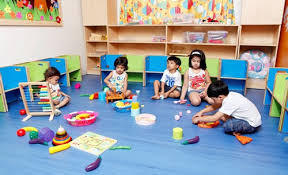
2. Adapting to Technological Advancements
With technology becoming integral to our lives, children must develop digital literacy from a young age. Modern early education programs integrate age-appropriate technology, teaching children to use digital tools responsibly while balancing screen time with hands-on activities that stimulate creativity and motor skills.
3. Fostering Social and Emotional Skills
In a world increasingly focused on individuality, the value of collaboration, empathy, and teamwork cannot be overstated. Early education centers are the first places where children learn to share, resolve conflicts, and form relationships outside their family circles. These social and emotional skills form the backbone of their future success.
4. Cultivating a Lifelong Love for Learning
Engaging, play-based curriculums in early childhood education spark curiosity and creativity, instilling a love for learning that lasts a lifetime. By fostering a positive attitude towards education from the start, these programs set the stage for academic and personal growth.
5. Promoting Equality and Inclusivity
Access to quality early education is a vital tool in reducing inequalities. It ensures that every child, regardless of their socioeconomic background, starts their educational journey on an equal footing. This inclusivity helps create a more just and equitable society.

Early childhood education is not merely about teaching ABCs or 123s; it is about shaping the minds and hearts of the next generation. In today’s uncertain world, investing in the early years of a child’s life is more crucial than ever. By prioritizing quality early education, we empower children to reach their full potential and build a brighter, more resilient future for everyone.
Guru Global School Top Kindergarten in Indore is an educational institution dedicated to nurturing young minds. With a focus on holistic development, the school combines innovative teaching methods, a child-centric curriculum, and engaging activities to create a joyful learning environment. Guru Global School aims to build a strong foundation for children, preparing them for future academic success.
#best preschool for kids#preschool in indore#best daycare in indore#best nursery schools#daycare for toddlers#top kindergarten in indore#kids schools bengali square#top senior kg school in indore#junior kg school in bengali square#best junior kg school
0 notes
Text
Best 5 Moral Stories That Inspire and Teach Children Valuable Life Skills
Stories have always been a timeless way to impart valuable life lessons to children. They are engaging, relatable, and leave a lasting impression on young minds. Teaching children moral values through stories helps them develop critical thinking, empathy, and ethical behavior. Here are five of the best moral stories and the life lessons they impart, along with their benefits for children.
1. The Boy Who Cried Wolf
Moral: Always speak the truth, as lying can lead to loss of trust and credibility. This classic tale revolves around a shepherd boy who lies about a wolf attacking his sheep. When the wolf finally appears, no one believes him, leading to disastrous consequences. Benefit for Children:
Teaches the importance of honesty.
Helps children understand the consequences of lying.
Encourages trustworthiness in relationships.
2. The Tortoise and the Hare
Moral: Slow and steady wins the race. This story showcases a race between a hare, confident of his speed, and a tortoise, which moves slowly but steadily. The tortoise's determination ultimately leads to his victory. Benefit for Children:
Highlights the value of persistence and focus.
Shows that overconfidence can lead to failure.
Motivates children to work consistently towards their goals.

3. The Lion and the Mouse
Moral: No act of kindness is ever wasted. In this story, a small mouse repays a lion's earlier kindness by freeing him from a hunter’s net. This teaches that even the smallest of beings can make a big difference. Benefit for Children:
Promotes kindness and compassion.
Encourages helping others without expecting anything in return.
Builds empathy and respect for others, irrespective of size or strength.
4. The Thirsty Crow
Moral: Where there’s a will, there’s a way. The thirsty crow finds a way to drink water from a pot by dropping pebbles into it, raising the water level. This story emphasizes problem-solving and resourcefulness. Benefit for Children:
Enhances creativity and critical thinking.
Teaches determination in overcoming obstacles.
Instills a can-do attitude in challenging situations.

5. The Ant and the Grasshopper
Moral: Hard work and preparation lead to success. This tale contrasts the hardworking ant, who prepares for winter, with the carefree grasshopper, who struggles when the cold season arrives. Benefit for Children:
Stresses the importance of planning and hard work.
Encourages responsibility and foresight.
Demonstrates the rewards of diligence.
Benefits of teaching children through stories
Improves Imagination: Stories transport children to different worlds, boosting their creativity and imagination.
Enhances Vocabulary and Communication Skills: Listening to stories helps children expand their language skills and express themselves better.
Builds Emotional Intelligence: Stories with moral lessons help children understand emotions and develop empathy.
Strengthens Values: Moral tales shape children’s character by instilling virtues like honesty, kindness, and perseverance.
Creates Lifelong Learners: Stories encourage curiosity and a love for learning, setting the foundation for lifelong education.
Incorporating moral stories into a child’s daily routine is a wonderful way to teach life lessons in an enjoyable manner. These tales not only entertain but also shape children into responsible, compassionate, and thoughtful individuals. Start reading these stories with your child today and witness the positive changes in their behavior and perspective.
Guru Global School Best Preschool for Kids offers a nurturing and stimulating environment where young minds thrive. With a focus on innovative learning, interactive activities, and individual attention, we ensure every child’s holistic growth. Our expert educators and engaging curriculum prepare kids for a bright future, making learning a joyful journey.
#best preschool for kids#preschool in indore#best daycare in indore#top kindergarten in indore#daycare for toddlers#kids schools bengali square#best nursery schools#top senior kg school in indore#junior kg school in bengali square#best junior kg school
0 notes
Text
The Importance of Vocabulary Learning in Early Childhood
Vocabulary development is a cornerstone of early childhood education. It not only shapes how children communicate but also influences how they perceive and interact with the world around them. Building word power during these early years has profound and far-reaching benefits for a child’s cognitive, emotional, and social development.
1. Enhanced Communication Skills
A rich vocabulary empowers children to express their thoughts, feelings, and ideas with clarity and confidence. It enables them to articulate their needs and participate in meaningful conversations, fostering stronger connections with peers and adults.
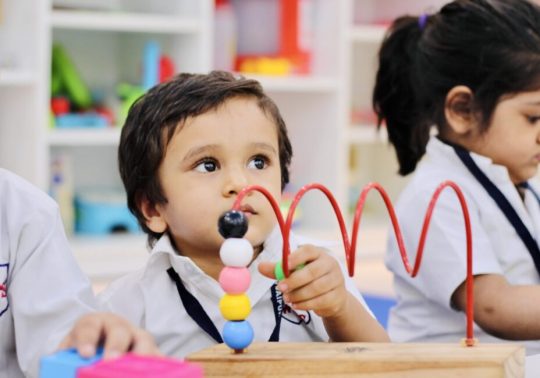
2. Academic Success
Vocabulary is the foundation of literacy. Children with a strong word base find it easier to understand instructions, comprehend stories, and excel in reading and writing. A well-developed vocabulary also improves problem-solving skills, as children can better grasp and analyze new concepts.
3. Boosted Confidence
When children can communicate effectively, they feel more confident in social settings. This self-assurance encourages them to participate actively in group activities, ask questions, and share their opinions, laying the groundwork for future leadership and collaboration skills.
4. Cognitive Development
Learning new words stimulates the brain, enhancing memory and critical thinking abilities. It also strengthens a child’s ability to categorize, associate, and understand relationships between ideas, which are essential for cognitive growth.
5. Increased Curiosity and Creativity
As children learn new words, they become curious about their meanings and applications. This curiosity drives exploration and creativity, encouraging them to engage in imaginative play and storytelling.
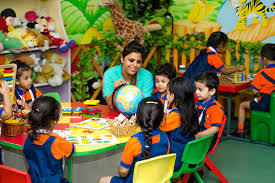
How to Foster Vocabulary Growth in Early Childhood
Story time: Reading books aloud exposes children to new words and contexts, making learning enjoyable.
Interactive Play: Games like word puzzles or storytelling encourage active engagement with language.
Everyday Conversations: Incorporate rich vocabulary into daily interactions to naturally expand your child’s word bank.
Songs and Rhymes: These are fun ways to introduce new words while improving memory retention.
In early childhood, every word a child learns is a step toward building a lifetime of communication and comprehension skills. Parents and educators play a pivotal role in nurturing this growth by creating a language-rich environment filled with opportunities to explore and learn. Investing in vocabulary development at this stage ensures children are better prepared for academic success and the challenges of life ahead.
Guru Global Kids School in Indore dedicated to nurturing young minds through a blend of innovative teaching methods and a child-friendly environment. Focused on holistic development, the school offers engaging activities, interactive learning, and values-based education to prepare children for a bright future.
#best preschool for kids#preschool in indore#top kindergarten in indore#best nursery schools#best daycare in indore#daycare for toddlers#kids schools bengali square#top senior kg school in indore#junior kg school in bengali square#best junior kg school
0 notes
Text
How Play Schools Shape Little Minds: Cognitive Development in Early Years
Early childhood is a critical phase of development. It's a time when children are naturally curious and eager to learn about the world around them. A well-structured play school can provide an ideal environment for this exploration, helping to nurture and enhance a child's cognitive development. Cognitive development refers to how children think, explore, and figure things out.
Structured Play and Exploration
Play schools create a safe and structured environment where children can explore new things and satisfy their innate curiosity. Activities in play schools are designed to encourage children to engage their senses, ask questions, and experiment with new ideas. Through this, they develop an understanding of their surroundings, which is a foundational aspect of cognitive development.
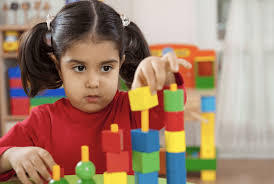
Language Development
Language is central to cognitive development, and play schools provide a language-rich environment. Through storytelling, singing songs, and conversational interactions, children learn to express themselves more clearly and understand others better. Group activities, like circle time, encourage children to listen to instructions, ask questions, and share their thoughts.
Memory Enhancement
Play schools often introduce memory-based games that encourage children to remember sequences, patterns, or stories. This helps strengthen short-term memory, which is a stepping stone for more complex cognitive functions as they grow older. Activities like storytelling, reciting rhymes, and learning songs also strengthen recall ability.
Social Interactions and Emotional Regulation
Cognitive development is not only about thinking and problem-solving but also involves learning to navigate social interactions and emotions. In a play school setting, children interact with peers, which help them understand social cues, take turns, and build empathy.
Imagination and Creativity
Play schools encourage imaginative play, which is crucial for cognitive development. When children engage in pretend play, they develop their creativity, flexibility in thinking, and the ability to think abstractly. For instance, a child pretending to be a doctor learns to empathize, think through situations, and make decisions.
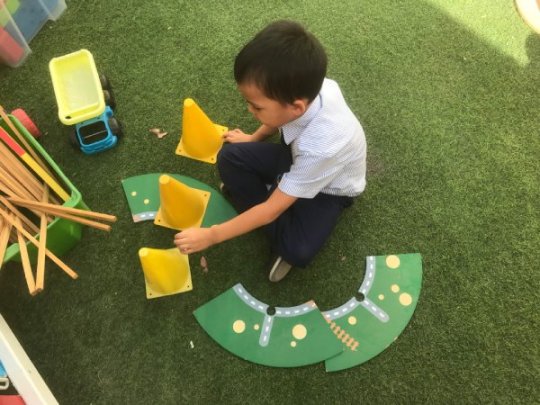
The role of play school in a child’s early years is invaluable for cognitive development. By creating an environment where children can explore, socialize, experiment, and express themselves, play schools provide the foundational skills for learning and thinking critically. These experiences not only prepare children for future academic pursuits but also lay the groundwork for emotional intelligence, problem-solving, and creativity.
Guru Global Preschool in Indore is dedicated to providing a nurturing and stimulating environment for young learners. With a focus on holistic development, our programs are designed to foster curiosity, creativity, and foundational skills through play-based and interactive learning. Our experienced teachers guide children in exploring concepts that encourage cognitive, social, and emotional growth.
#preschool in indore#best preschool for kids#top kindergarten in indore#best nursery schools#daycare for toddlers#best daycare in indore#kids schools bengali square#top senior kg school in indore#junior kg school in bengali square#best junior kg school
0 notes
Text
Easy ways to help your child write their name
Helping a child learn to write their name is a significant milestone in early childhood education. Not only does it lay the foundation for literacy, but it also fosters a sense of independence and self-identity. In a preschool setting, this process can be made enjoyable and stress-free by incorporating creative, playful techniques that keep young learners engaged.
Creating a Personalized Learning Environment
Begin by making name-writing practice a part of daily routines in preschool. Use name tags, cubby labels, and attendance charts featuring each child’s name to encourage recognition. Personalizing materials with a child’s name not only helps in recognizing their name but also reinforces the importance of letters and words in everyday life. As they see their names more frequently, they build familiarity with the letters, making it easier to start writing.

2. Breaking It Down: Letter by Letter
Learning to write a name can seem daunting, especially if it’s long or has unique spellings. Encourage preschoolers to start small by practicing each letter individually. Use colorful markers, crayons, or chalk to trace letters on paper or even use tactile methods like tracing in sand, clay, or rice. This helps young learners develop fine motor skills while making the learning process enjoyable and sensory-rich.
3. Using Tracing Activities for Letter Formation
Tracing activities are excellent for teaching preschoolers how to form letters. You can create worksheets with dotted outlines of each child’s name or use laminated sheets and dry-erase markers for reusable practice. As children trace, they begin to understand the structure and sequence of each letter, which helps build confidence for writing without assistance.
4. Incorporating Playful Tools and Techniques
Use different materials to keep the learning process fresh and engaging. For example, writing names with finger paints, chalk on blackboards, or even in shaving cream can make practicing more exciting. Play dough letters are another fun way to introduce the shapes of letters, as children can mold each letter of their name before attempting to write it. These multi-sensory methods can make name-writing practice feel more like play than a task.

5. Making Use of Songs and Rhymes
Preschoolers respond well to rhythm and repetition, so incorporating songs or rhymes about the letters in their names can enhance memorization. Simple tunes can help children remember the order of letters and make the learning process joyful. Try singing the letters in their name to familiar melodies like “Twinkle, Twinkle, Little Star” or “The Alphabet Song” for a catchy, fun twist on letter recognition.
Teaching preschoolers to write their names is a wonderful journey that combines creativity, fun, and learning. By using diverse activities and a patient, encouraging approach, parents and teachers can make name-writing a cherished experience in early education. This early accomplishment not only builds foundational skills but also instills confidence and pride in every child, preparing them for more learning adventures ahead.
Guru Global School Pre Primary School in Indore is dedicated to creating a vibrant foundation for young learners. With a blend of innovative teaching methods and hands-on activities, the school encourages curiosity, creativity, and holistic development in every child.
#preschool in indore#top kindergarten in indore#best daycare in indore#best preschool for kids#best nursery schools#top senior kg school in indore#kids schools bengali square#daycare for toddlers#junior kg school in bengali square#best junior kg school
0 notes
Text
Winter Care Tips for Preschoolers: Keeping Kids Warm and Healthy
As winter approaches, preschoolers' comfort, warmth, and health become primary priorities. Children's immune systems are still developing, making them more open to colds and flu, so preventive care is vital. This guide will discuss basic yet effective winter care practices to help parents keep their Kids warm, healthy, and engaged.
1. Dress for the Weather: Layer Up!
Opt for Layers: Layers provide insulation and allow for easy temperature adjustment. Start with a breathable base layer to wick away moisture, then add a warm middle layer, and top it with a waterproof outer layer for protection against rain or snow.
Cover Extremities: Preschoolers lose body heat quickly through their heads, hands, and feet, so be sure they wear hats, gloves, and insulated socks or boots. Waterproof mittens are better than gloves for young children, as they help keep fingers warmer.
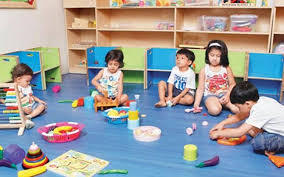
2. Maintain Healthy Skin: Protect Against Dryness
Moisturize Regularly: Cold weather can dry out children’s sensitive skin, causing discomfort. Apply a child-safe moisturizer to exposed areas like the face, hands, and lips. Using a thicker, fragrance-free lotion twice a day can help keep skin soft and hydrated.
Sun Protection is Still Essential: Although the sun’s warmth may feel weaker, UV rays still penetrate in winter. Use a gentle, broad-spectrum sunscreen on any exposed skin, especially if snow is present, as it can reflect UV rays.
3. Stay Hydrated: Hydration isn’t just for summer
Encourage Regular Water Intake: Cold weather can sometimes reduce thirst, but children still need fluids for their bodies to function optimally. Warm beverages like herbal teas or soups are great alternatives to help keep them hydrated.
Incorporate Hydrating Foods: Foods with high water content, such as oranges, cucumbers, and soups, can also contribute to hydration. Make drinking water fun by offering a colorful cup or straw to encourage sipping.

4. Promote Healthy Eating: Boost Immunity
Focus on Nutrient-Rich Foods: A diet rich in fruits, vegetables, and whole grains can help boost the immune system. Include foods high in vitamin C, like oranges, strawberries, and broccoli, and foods rich in zinc, such as dairy products and whole grains, for added immune support.
Offer Warm, Nourishing Meals: Warm meals such as soups, porridge, and stews are comforting and beneficial in winter. They help maintain body warmth and provide essential nutrients.
5. Ensure Adequate Sleep: Vital for Immunity and Growth
Establish a Sleep Routine: A consistent bedtime routine supports immune health and helps children feel refreshed and energetic. Aim for 10-12 hours of sleep per night for preschoolers.
Create a Cozy Sleeping Environment: Ensure their room is warm but well-ventilated. Use a humidifier if the air is dry, and consider adding extra blankets to create a comfortable and inviting sleeping space.
Winter can be a fun, cozy season with the right care. By following these essential winter care tips, you’ll not only protect your children health but also allow them to enjoy the magic of the season.
Guru Global School is a Top kindergarten in Indore, known for its child-centered approach to early education. The school offers a vibrant and stimulating environment where young learners engage in hands-on activities that support their growth in academics, creativity, and social skills. With a dedicated team of educators, Guru Global School aims to build a strong foundation, inspiring a love for learning in each child.
#top kindergarten in indore#best preschool for kids#best daycare in indore#best nursery schools#daycare for toddlers#preschool in indore#kids schools bengali square#top senior kg school in indore#junior kg school in bengali square#best junior kg school
0 notes